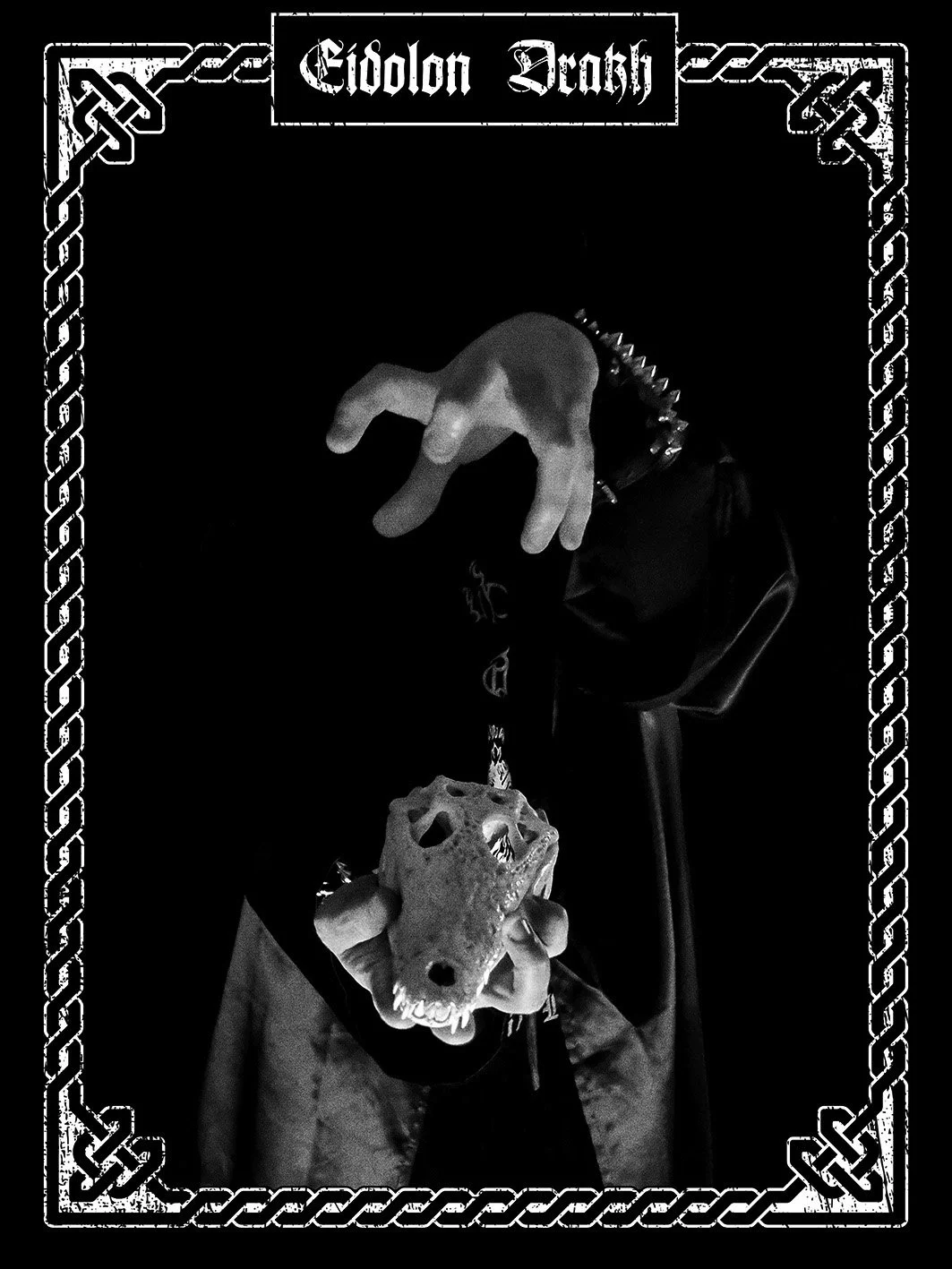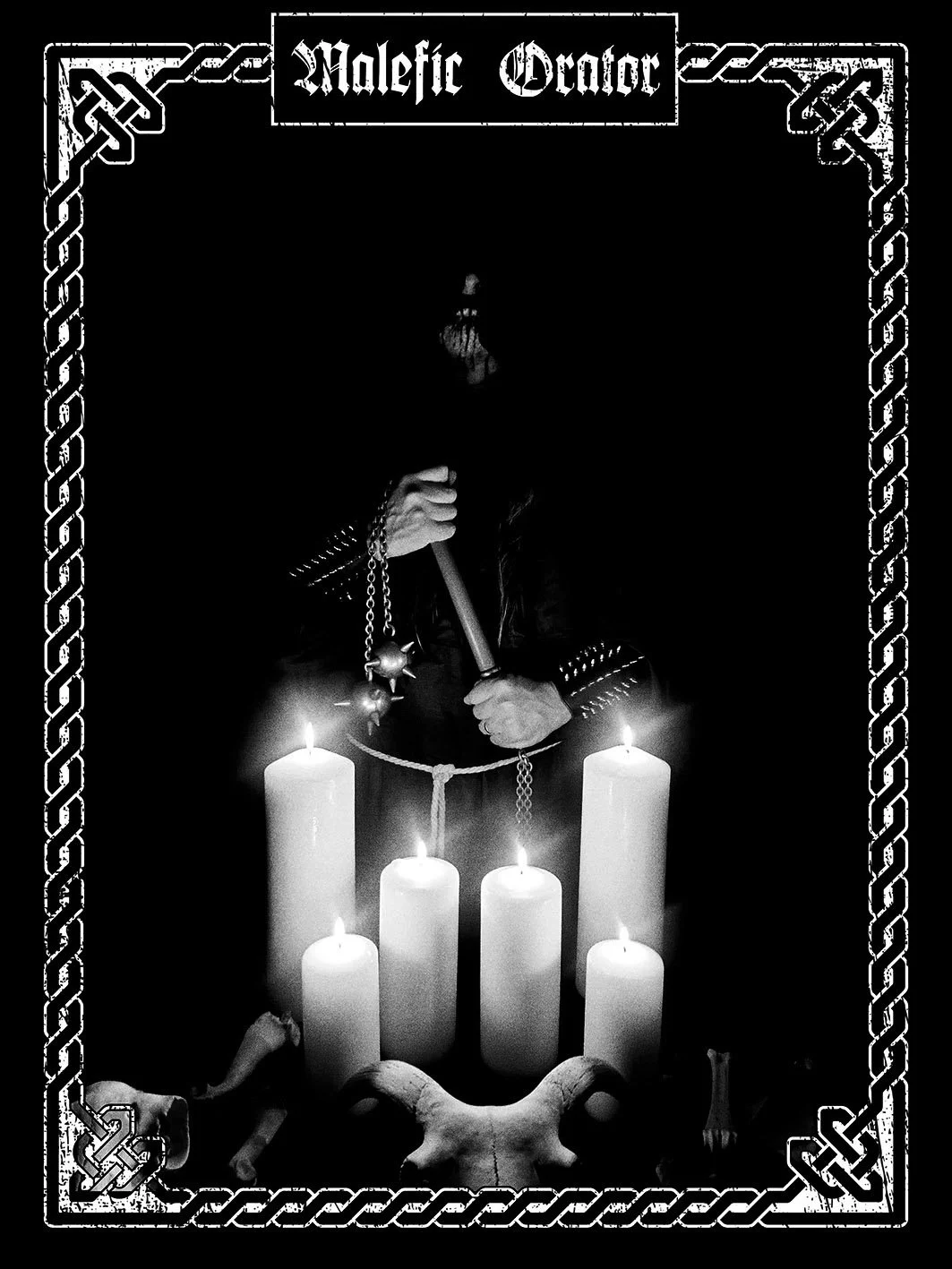
“At heart, Achathras expresses my personal experience of discovering black metal, the transformative effect it had on my life, and the honeymoon period thereafter.”
ACHATHRAS
NEW INTERVIEW AND SINGLE
———————————————————
Cult Never Dies exists to celebrate both the past and present of extreme and underground metal, and as such, we are always interested in bands celebrating the early sound and ethos of the black metal genre. However, though one often hears newer bands talk of drawing upon the spirit of ‘true’ and ‘old school’ black metal, this, more often than not, simply means taking inspiration from the Mayhem/Darkthrone/Burzum axis of early 90s Norway. nothing wrong with that intrinsically, but those of us present in the 1990s know well that the genre was so much broader than that in those years, even if many of the works are not currently in favour with the black metal crowd.
Thus, we are very proud to introduce our newest signing, Achathras. Created in the shadows by a collective of black metal veterans, Achathras is a resurrection and celebration of the values of the early to late-90s European black metal scene, a time when aggressive riffs, atmospheric songwriting, caustic vocals and otherworldly synth work offered a true alternative to the garbage of the mainstream.
Epic and at times melodic, while remaining fiercely unpolished, the band’s memorable songwriting will resonate with those missing the departed spirit found in the early albums of Gehenna, Odium, Emperor, Hecate Enthroned, Obtained Enslavement, Taake, Old Man’s Child, Ancient, Dimmu Borgir, Abigor, Covenant, Malignant Eternal, Forefather and Mork Gryning.
Yet for all that, the songs crafted by these fanatics are utterly fresh, and while the musical and ideological foundations hail from the past, the group are utterly against simply rehashing past glories. We caught up with the band’s founding member to coincide the release of the second single ‘The Despiser Triumphant’, which follows hot on the heels of debut single ‘Anointed with Moonfire’.
Cult Never Dies: The identities of the musicians involved with Achathras are hidden in shadow, but we can perhaps at least ascertain that all involved are no newcomers to black metal and indeed are keen to celebrate an earlier era of the genre. Can you tell us a bit about the musical aims behind the band and the sort of bands and albums that inspired you?
“At heart, Achathras expresses my personal experience of discovering black metal, the transformative effect it had on my life, and the honeymoon period thereafter. Specifically, this covers the period from the cusp of my sixteenth birthday, in 1997, through to early 1999. Achathras primarily celebrates those bands and also acts as an introspective dialogue with that naïve, spellbound sixteen-year-old self, trying to capture the sense of magic and possibility that I felt at the time.”
“In no particular order, the bands that directly inspired us for Achathras (disregarding the obvious/inescapable big names) include the early works of: Odium, Obtained Enslavement, Abigor, Hecate Enthroned, Ancient, Gehenna, Sacramentum, Vinterland, Mork Gryning, Old Man’s Child, Borknagar, Kvist, Keep of Kalessin, Windir, Abyssos, Lord Belial, Malignant Eternal, Darkwoods My Betrothed, Behemoth, Sorhin, Limbonic Art, Covenant, Tartaros, Ordo Draconis, etc.”
Your forthcoming debut album, A Darkness of the Ancient Past, acts as a resurrection and celebration of the values of the early to late-90s European black metal scene. Curiously, given that black metal often draws upon its own past, the evocative and epic approach you take has been somewhat left in the past, and when bands talk of playing 90s black metal, they often use it as shorthand for working with a Darkthrone/Burzum musical template. What inspires you about this era and interpretation, not least the heavy use of synth that so many key bands embraced?
“It’s a cliché to bemoan the loss of mystique in black metal over the years, but it’s hard otherwise to explain how different black metal felt in the time before the domination of the internet. At a time when, Cradle of Filth aside, the mainstream metal media was relatively hostile (before Emperor and then others of the big names at least began to be rehabilitated), it felt very fringe and clandestine. So at a time when a lot of the original second wave players and their contemporaries considered the scene to be egregiously diluted, I was experiencing it anew as a magical hidden world, and a lot of the so-called ‘third wave’ bands and albums were inextricably part of that immersion.”
“While I can understand the jaded perspective of those that came before – and appreciate that it is apparently in the nature of each successive generation of black metal initiates to pull the ladder up behind them – there is a lot of black metal from this period that for many years was unsung, or unfairly maligned, and that means a great deal to me (though, it must be said, many of these have later received belated recognition, perhaps from finding a less cynical audience). One of the things I find particularly compelling in this period is the fantasy elements and imagery that many bands deployed, whether that be explicit Tolkien worship, taking aesthetic cues from RPGs, or more implicitly through lyrical style and motifs. This evocative and otherworldly framing aligned very strongly with my reading habits and interests at the time and helped me to engage with the music. It’s also an approach that seems very much of its time, being superseded by a series of backlashes in all directions, from the slick futurism of later Moonfog, or the turn back towards visceral ugliness from the likes of early Watain, Craft, etc., to the orthodox Satanism of Deathspell Omega, Funeral Mist etc. Despite going in different directions myself with other projects, that fantastical approach remained very dear to me and something that I missed. With Achathras, I wanted to provide my own take on this, an honest expression of devotion for this bygone style without kitsch or parody. There’s always a danger with something this ostensibly backwards-looking that it can feel contrived or a detached exercise; in which case I need to reiterate that this formative experience continues to be a rich and meaningful part of my life.”
You have eschewed any demo release and crafted a very powerful, professional-sounding and evocative debut album. This is perhaps an unusual approach. How did things play out in that sense?
“There was no grand design involved in stepping over the demo stage; when I gathered the material together, I had enough for a coherent and rounded full-length release. As musicians, we are all experienced and accustomed to operating independently, so the execution was simply a matter of time and effort, and because we were each able to work remotely, the constraints that normally necessitate a demo stage – mostly a lack of budget and resources – didn’t particularly apply. To impose a demo structure and approach where none was required, for the sake of jumping through that particular hoop, would have felt a bit facile.”
Could you give us some insight into the lyrical and thematic content of the album? Achathras is a Tolkien reference – is the author an inspiration for the songs as a whole?
“The lyrics and themes attempt to reach that sweet spot between early nineties fantasy/RPG culture and second wave black metal unearthliness that I’ve tried to describe. Because Achathras’ music is generally very melodic, it falls to the lyrics to provide the necessary darkness. I’ve tried as much as possible to put myself in a mid-90s mindset and concentrate on what excited and energised me about black metal at that time. There’s a number of fantasy authors and settings that I drew on for this – and as Tolkien is the colossus that bestrides the world of fantasy, his work is naturally at the forefront – but I’ve taken pains to avoid explicit references, just to provide as much room as possible for the listener to explore the imagery and engage on their own terms, much as (for example) Mortiis’ Emperor lyrics evoke vivid imaginative worlds without prescribing a specific interpretation. It’s black metal as a window into a kind of highly representational, rarefied, dream-like space, rather than as a simple vehicle for blasphemy or hatred.”
Without giving anything away, those involved in the creation of A Darkness of the Ancient Past are collectively responsible for a lot of black metal (and related) albums and projects – what does Achathras provide that is unique for you as musicians and creators?
“The music I make is generally self-reflexive and driven by the need to explore and interrogate different aspects of my own life, with the various projects orientated around discrete experiences. I think I’ve probably inadvertently answered this question, but essentially Achathras is about capturing a magical moment of black metal for me, as honestly as possible.”
Your songs feel extremely fresh and full of life, and you avoid simply rehashing past glories, despite almost nostalgic nods to some of the legends of yesteryear. Is this a challenging balance?
“When composing, I try very hard to avoid replicating things I’ve heard before as much as possible. Especially when making music to evoke a specific period in the development of a genre, it is very easy – and very tempting – to be overly reverential, but doing so only serves to diminish the value and relevance of the resulting work. It’s the dictum in action that ‘Imitation is the sincerest form of flattery that mediocrity can pay to greatness’. It’s hard to pinpoint something in particular I do to avoid this, other than to push myself to keep writing for as long as it takes and to be very self-critical!”
Given that the musical and ideological foundations of the band both draw on the past, I was curious to know your thoughts about black metal as a whole in 2025, perhaps in comparison to what you experienced during the 1990s.
“Because of the way the scene has proliferated, trying to keep any sort of track of it has never been more of a Sisyphean task, but I do try to remain open to new bands even if I am more heavily reliant than ever on recommendations from friends. As with all culture, the internet and social media have fundamentally reconfigured the landscape, so even if the genre had remained frozen in time creatively for 30 years, there would still be no comparison. I’m just glad that I was able to experience it in a magical way, if only for a while. That said, while I find it hard to imagine other people have similar experiences in a post-internet world, that doesn’t mean they don’t, and I’m not going to pontificate about what black metal is or isn’t supposed to be or declare an arbitrary expiry date. People have been announcing the death of black metal for 30 years, and it’s just as fatuous now as it was then. And if the quality of discourse about black metal online is less than edifying (which it is), it’s easy enough to ignore.”





